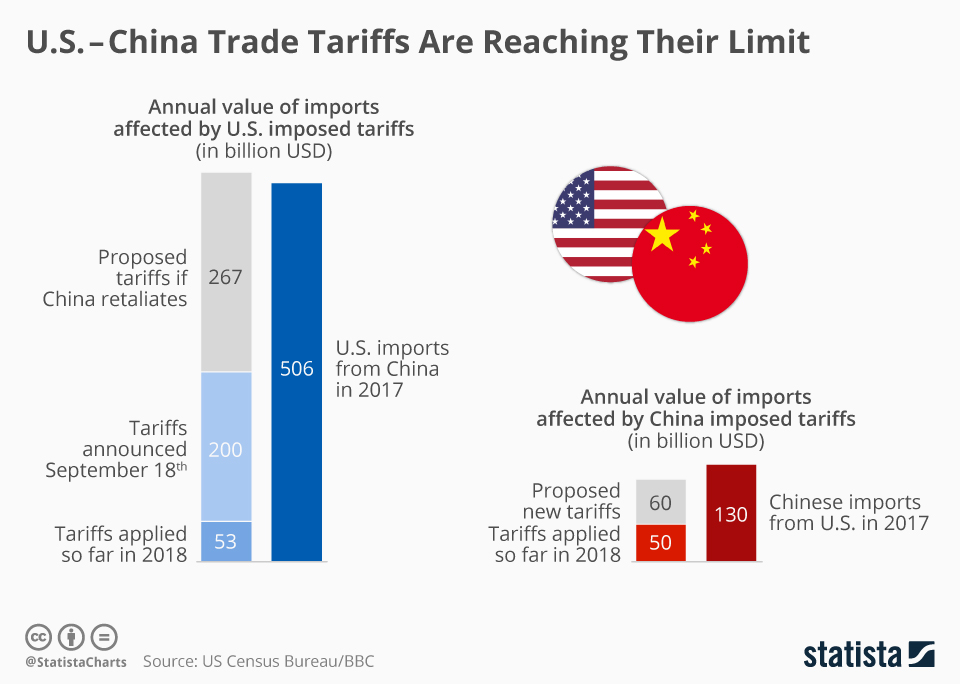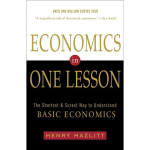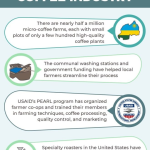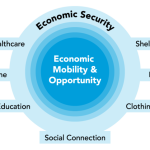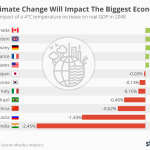China tariffs are reshaping the landscape of international trade, particularly influencing US-China trade relations. As policymakers and economists scrutinize the economic impact of tariffs, it becomes evident that these levies can instigate substantial supply chain disruptions not only within the United States but across the globe. The increased costs associated with these tariffs raise concerns about rising prices for American consumers while altering traditional supply chains that many businesses rely on. Furthermore, such a tariff policy could have far-reaching effects, prompting further international trade negotiations among allied nations in response to shifting trade dynamics. The implications are complex, as nations ponder their economic strategies amidst unfolding trade wars and evolving global alliances.
Tariffs imposed on China are sparking significant shifts in the global economic landscape, affecting bilateral trade dynamics and overall market stability. The mechanisms of these trade barriers influence how countries navigate their economic relationships, especially as they seek to mitigate the adverse effects of increased import duties. Analysts are monitoring how these protective measures not only impact supply chain reliability but also the potential for economic reciprocity between nations. In this interconnected web of international commerce, responses to tariff policies compel countries to reassess their trade strategies and engage in robust negotiations. As stakeholders evaluate these changes, the broader effects of tariffs on global markets remain a key consideration.
The Ripple Effects of China Tariffs on the U.S. Economy
Imposing tariffs on goods imported from China can set off a series of unexpected ripple effects within the U.S. economy. Chief among these is the potential for increased prices on consumer goods. With tariffs levied at high rates, such as 25% or even 60%, manufacturers may face significant cost increases when sourcing parts and materials from China. These increased costs are likely to be passed onto American consumers in the form of higher retail prices. This means everyday items, from electronics to clothing, could become more expensive, impacting consumers and potentially slowing down consumer spending—one of the vital engines of U.S. economic growth.
Additionally, the economic impact of tariffs is not limited to rising prices. Supply chain disruptions are highly probable as companies scramble to find alternative suppliers or adapt to changing trade environments. Industries heavily reliant on just-in-time manufacturing could encounter delays and shortages, resulting in production halts. The strain on domestic manufacturers to find new sources can lead to labor shortages, as companies struggle to fill gaps left by the absence of previously sourced Chinese goods. In essence, while tariffs aim to protect U.S. industries from foreign competition, they could inadvertently weaken the domestic economy.
U.S.-China Trade Relations: A New Era or Continued Tension?
The potential reinstatement of high tariffs under a new administration signals a pivotal moment in U.S.-China trade relations. Observers indicate that this could either lead to a new era of negotiation or exacerbate existing tensions. Both nations must navigate a complex web of economic interdependence, where both sides benefit significantly from bilateral trade. If negotiations can be approached realistically, there may be room for compromise that mitigates the adverse effects of tariffs, fostering a more stable trade environment.
However, if tariffs escalate into a full-blown trade war, the ramifications could be severe not just for the U.S. and China, but for global markets. The unpredictability of such a scenario raises concerns about international trade negotiations and collaboration among allied nations. Countries may be compelled to choose sides, which could lead to further isolation or realignment within global trading systems. Thus, the ongoing tension presents a critical juncture for economic diplomacy and trade dynamics between two of the world’s largest economies.
Economic Strategies: How China is Adapting to Potential Tariffs
In anticipation of potential U.S. tariffs, China is actively strategizing to adapt to a changing economic landscape. With the probability of tariffs affecting its exports, Chinese policymakers have begun diversifying their economic approach and seeking new markets in emerging economies. Notably, initiatives like the Belt and Road Initiative aim to strengthen economic ties with regions in Southeast Asia, Africa, and Latin America. This shift not only mitigates the reliance on the U.S. market but also enhances China’s global influence and competitive stance.
Moreover, the Chinese government is committing to stimulating domestic demand and reducing the trade surplus, seeking a more sustainable economic structure. Through fiscal stimulus and support for consumer spending, China is attempting to balance its export-heavy economy with robust domestic consumption. This pivot could reshape China’s economic model, allowing it to navigate the complexities of international trade relationships while building resilience against U.S. tariffs.
Tariff Policy Effects: Short-Term Gains vs. Long-Term Consequences
When discussing tariff policies, a critical consideration is the balance between short-term gains and long-term consequences. While imposing tariffs may provide immediate relief to domestic industries by curbing foreign competition, the broader economic impact often unfolds more slowly and unpredictably. These policies can prompt retaliation from trading partners, leading to a tit-for-tat escalation that can hinder economic growth and destabilize global supply chains.
Furthermore, the reliance on tariffs as a primary tool for negotiation may hinder the U.S. government’s ability to engage in constructive dialogue with allies and adversaries alike. Over time, such a confrontational approach could lead to lasting damage to international relationships. As countries band together against perceived aggression, the United States risks losing out on cooperation with its allies, which historically has been a cornerstone of its global economic strategy.
International Trade Negotiations: The Path Forward
In light of the impending tariffs and ongoing tensions in U.S.-China trade relations, the landscape for international trade negotiations appears fraught with challenges. The potential for trade agreements hinges upon both countries’ willingness to engage in dialogue. Each side must approach negotiations with an open mind, ready to explore alternative solutions that prioritize mutual benefits over punitive measures. Failure to engage could lead to a prolonged stalemate, further complicating the economic landscape.
Moreover, the involvement of other countries in international trade negotiations adds another layer of complexity. Nations like Japan and those within the EU could redefine conventional alliances based on shared trade interests as they assess the implications of U.S. tariff policies. For instance, collaborative negotiations among these countries can create a counterweight to U.S. demands, potentially challenging America’s long-held dominance in international trade strategy.
Supply Chain Disruptions: Understanding the Risks Ahead
Supply chain disruptions are a critical concern amid changing tariff policies. The dependency on intricate global supply chains means that disruptions can have domino effects across various industries. With a significant portion of U.S. goods sourced from China, even minor tariffs can lead to major issues for manufacturers, resulting in delays, increased costs, and diminished product availability. The intricacies of defining the origin of goods can complicate compliance with new regulations, leading to unintentional violations and penalties.
As companies seek alternative sourcing strategies, there’s an increasing push to diversify supply chains beyond China. Countries like India and Vietnam are gaining traction as alternatives; however, they may not yet have the infrastructure or capacity to fully replace Chinese manufacturing capabilities. Any abrupt shift away from China could lead to short-term production bottlenecks, which could ultimately prevent companies from meeting consumer demand and fulfilling market needs.
Labor Shortages: A Hidden Cost of Tariff Policies
Labor shortages represent another hidden cost associated with new tariff policies. As companies attempt to adjust their supply chains and navigate the complexities of tariffs, they may find themselves facing workforce challenges. High tariffs can lead to reduced production capabilities and slower growth for companies that rely heavily on affordable imported components. When manufacturing processes face additional strain, companies may need to decrease their workforce, leading to job losses in certain sectors.
Conversely, some sectors could experience an uptick in demand for skilled labor as companies transition their supply chains. This could exacerbate existing labor shortages in fields that require specialized skills and knowledge. Overall, the potential for job displacement coupled with the demand for highly skilled labor creates a complex labor market dynamic, further complicating the effects of tariff policies.
Currency Wars: The Broader Economic Implications
The prospect of renewed tariffs may also lead to currency wars, as countries attempt to manipulate their currency values to maintain their economic competitiveness. If the U.S. implements significant tariffs while other nations, particularly China, respond by devaluing their currencies to offset trade disadvantages, the global economy could face substantial volatility. Currency manipulation can exacerbate trade imbalances and incite retaliation from affected nations, further entrenching the ongoing cycle of protectionism.
In the broader context, a currency war may destabilize global markets, as unpredictable exchange rates impact international trade transactions. For American consumers, fluctuations in currency could translate to rising prices on imported goods, while exporters could find opportunities in weakened currencies abroad. Understanding these dynamics will be critical for policymakers as they navigate the complex terrain of international trade amid evolving tariff policies.
The Future of Trade Relationships in a Post-Tariff Era
Looking beyond the immediate impacts of China tariffs, the future of global trade relationships hangs in the balance. If tariffs persist or escalate, countries may seek to redefine their international alliances and secure new markets. The ongoing challenge will be finding a sustainable equilibrium that satisfies domestic economic pressures without alienating key trading partners. The efficacy of future trade agreements hinges upon each nation’s ability to prioritize collaboration over confrontation.
Moreover, the path forward requires a reevaluation of tariffs as a strategy. Countries will need to consider alternative options that promote fair competition and mutual benefits without resorting to punitive measures. A commitment to open dialogue and understanding the interdependencies of global trade systems will be paramount in fostering stable trade relationships in a post-tariff era. With the right approaches, nations can work together to forge stronger economic ties that withstand the challenges of the modern age.
Frequently Asked Questions
What are the main implications of China tariffs on US-China trade relations?
China tariffs can significantly affect US-China trade relations by increasing costs for American consumers and businesses, potentially leading to retaliatory measures from China. Tariffs may also disrupt established supply chains, making it more challenging for U.S. companies to procure goods efficiently and potentially hurting economic ties with allies.
How do China tariffs impact the economic landscape of the United States?
The economic impact of tariffs on China can lead to higher prices for imported goods, creating inflationary pressures in the U.S. economy. Increased costs can reduce consumer spending and hurt domestic producers that rely on imported components, ultimately impacting overall economic growth.
What challenges do U.S. companies face due to supply chain disruptions from China tariffs?
Supply chain disruptions caused by China tariffs can lead to delays in production and logistics challenges for U.S. companies. Businesses may struggle to find alternative suppliers or adjust their operations to cope with increased tariffs, resulting in reduced competitiveness and potential revenue losses.
What effects do tariff policy changes have on international trade negotiations involving China?
Tariff policy effects can complicate international trade negotiations as countries weigh their responses to U.S. tariffs on China. Countries may seek to strengthen ties with China or negotiate new trade agreements to mitigate the impacts of tariffs, thereby reshaping global trade dynamics.
How might the economic impact of tariffs influence future U.S. foreign relations?
The economic impact of tariffs can strain U.S. foreign relations by pushing traditional allies to reconsider their ties with Washington. If U.S. policies lead to burdensome tariffs on multiple nations, it could drive those countries closer to China, fracturing long-standing alliances and weakening U.S. influence in global markets.
| Key Points |
|---|
| China tariffs may backfire on the U.S. economy by raising consumer prices and disrupting supply chains, according to experts. |
| President Trump is considering imposing 25% tariffs on goods from Mexico and Canada and 10% on Chinese imports. |
| Economists warn that these tariffs could strengthen China’s ties with U.S. allies, complicating international relations. |
| The Chinese economy is vulnerable to a trade war due to its reliance on U.S. markets despite efforts to diversify. |
| Future negotiations could arise from these tariffs, potentially leading to a new trade agreement. |
| Uncertainty about tariff specifics creates challenges for China in planning its economic strategies. |
| Other countries like India and Vietnam might benefit, but replacing China’s manufacturing capacity won’t be easy. |
| A sweeping tariff approach may inadvertently unite China with other nations against U.S. policies. |
Summary
China tariffs, particularly those proposed by President Trump, could have significant repercussions not just for the U.S. economy but also for international relations. While aiming to protect domestic industries, these tariffs may elevate costs for consumers and provoke supply-chain disruptions. Furthermore, the potential for China to enhance relationships with traditional U.S. allies raises the stakes in this complex economic landscape. The implications of these tariffs extend beyond immediate trade impacts, emphasizing the importance of careful negotiation and consideration in U.S.-China relations.
